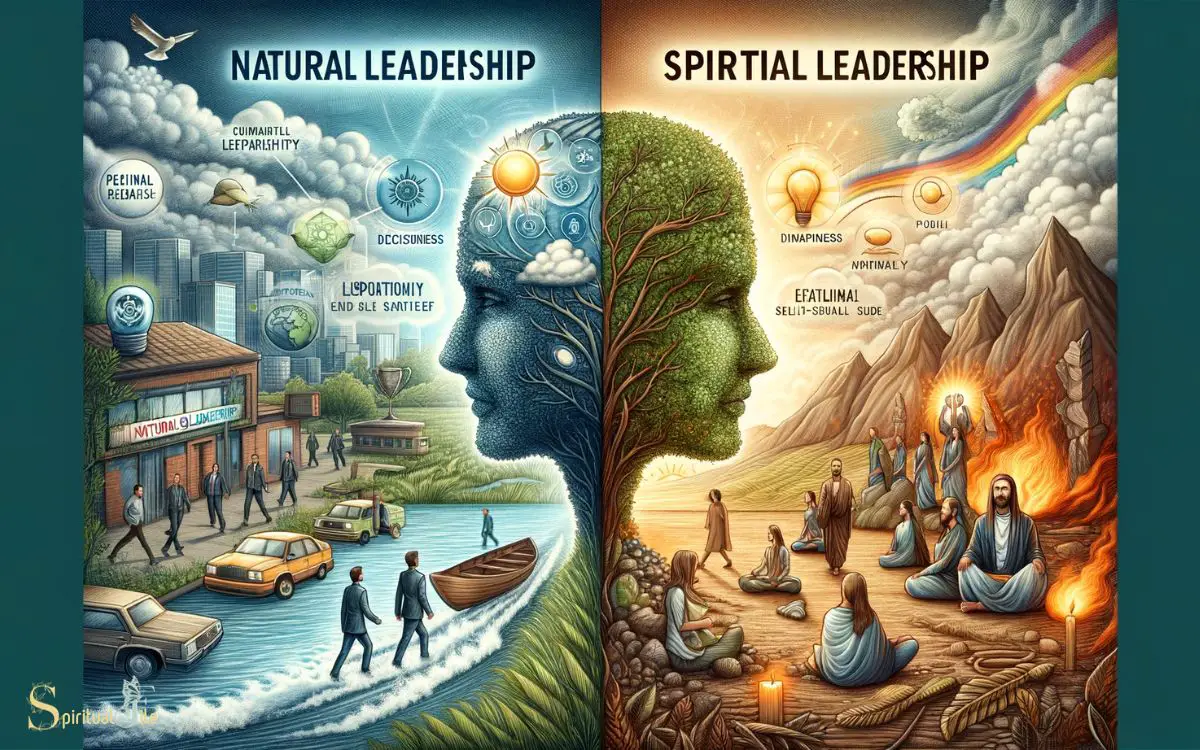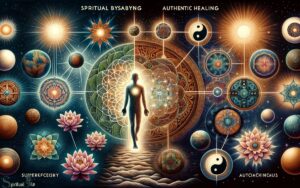Natural Leadership Vs Spiritual Leadership: Explain!
Natural Leadership versus Spiritual Leadership represents two distinct approaches to guiding others. Natural Leadership focuses on practical skills and learned behaviors essential for managing people and processes effectively.
In contrast, Spiritual Leadership is rooted in inner values and a connection to a higher purpose, influencing others through moral guidance and inspiration.
Natural Leadership often involves:
- Strategic thinking
- Decision-making abilities
- Communication skills
- Organizational capabilities
Spiritual Leadership, on the other hand, emphasizes:
- Ethical principles
- Compassion and empathy
- Inspirational motivation
- A sense of calling or higher purpose
For example, a natural leader might excel in project management, ensuring tasks are completed efficiently. A spiritual leader might inspire the team by connecting the project to a greater good, increasing motivation through a shared vision.
Bridging the gap between Natural and Spiritual Leadership can create a dynamic synergy, fostering an environment where practicality meets purpose, and where guidance is both grounded and transcendent.

Key Takeaway
5 Aspects: Natural Leadership Vs Spiritual Leadership
| Aspect | Natural Leadership | Spiritual Leadership |
|---|---|---|
| Source | Developed through experience and personality | Rooted in a deep sense of purpose and values |
| Focus | Emphasizes practical skills and results | Prioritizes inner growth and higher meaning |
| Motivation | Often driven by ambition and external rewards | Driven by inner calling and a sense of mission |
| Influence | Relies on authority and hierarchy | Inspires through authenticity and empathy |
| Impact | Tangible, short-term outcomes | Transforms individuals and communities |
Understanding Natural Leadership

Understanding natural leadership requires a comprehensive grasp of the innate qualities and characteristics that individuals possess, allowing them to guide and influence others through their inherent abilities and experiences.
Natural leaders often exhibit traits such as empathy, resilience, integrity, and the ability to communicate effectively. They possess a deep understanding of human behavior, which enables them to inspire and motivate others towards a common goal.
These leaders are typically self-aware, confident, and possess a strong sense of purpose. Their authenticity and genuine concern for the well-being of those they lead set them apart.
Natural leaders often emerge organically within groups, gaining respect and influence through their actions and the positive impact they have on others.
Understanding these inherent leadership qualities is essential for organizations seeking to identify and develop effective leaders.
Unpacking Spiritual Leadership

The concept of spiritual leadership encompasses the integration of deeply held personal values and beliefs into the act of guiding and influencing others within an organizational or communal context.
Spiritual leadership goes beyond traditional leadership principles and focuses on the holistic development of individuals and communities.
Key aspects of unpacking spiritual leadership include:
- Servant Leadership: Prioritizing the needs of others and serving them selflessly.
- Ethical Decision-Making: Emphasizing moral and ethical considerations in all leadership decisions.
- Emotional Intelligence: Understanding and managing emotions to foster healthy relationships and effective communication.
- Purpose-Driven Vision: Inspiring and motivating others through a shared sense of purpose and meaning.
These elements form the foundation of spiritual leadership, promoting a harmonious and inclusive approach to guiding and nurturing others.
Key Differences Between the Two

What sets natural leadership apart from spiritual leadership? While both types of leadership aim to inspire and guide others, they differ in their fundamental principles and approaches.
The table below outlines the key differences between natural and spiritual leadership:
| Natural Leadership | Spiritual Leadership |
|---|---|
| Based on innate traits and abilities | Rooted in personal values and beliefs |
| Focuses on practical goals and outcomes | Emphasizes holistic growth and transformation |
| Relies on authority and influence | Draws strength from inner wisdom and higher purpose |
| Often transactional in nature | Oriented towards service and selflessness |
| Driven by external rewards and recognition | Sustained by inner fulfillment and spiritual connection |
Understanding these distinctions is crucial in discerning the suitable leadership approach for different contexts and individuals. Next, let’s explore the strengths of natural leadership.
Strengths of Natural Leadership

As natural leadership is based on innate traits and abilities, it often leads to efficient decision-making and tangible results.
Natural leaders possess strengths that are valuable and beneficial in various settings:
- Clear Communication: Natural leaders tend to excel in articulating their thoughts and ideas, which fosters effective communication within teams.
- Decisiveness: They are often adept at making quick and effective decisions, leading to timely actions and outcomes.
- Adaptability: Natural leaders can easily adapt to new situations and challenges, ensuring continuity and progress even in uncertain circumstances.
- Confidence: Their self-assurance inspires trust and motivates others to follow their lead, creating a positive and productive work environment.
These strengths contribute to the effectiveness of natural leadership in achieving objectives and driving success.
Now, let’s explore the strengths of spiritual leadership.
Strengths of Spiritual Leadership

Continuing from the previous subtopic’s discussion of the strengths of natural leadership, spiritual leadership embodies a distinct set of qualities that contribute to its effectiveness in guiding and inspiring individuals and teams.
Spiritual leadership draws on values, ethics, and a deep sense of purpose to motivate and influence others.
Below is a comparison of the strengths of natural leadership and spiritual leadership:
| Strengths of Natural Leadership | Strengths of Spiritual Leadership |
|---|---|
| Focus on tangible goals and results | Emphasis on values and ethics |
| Utilizes authority and power | Relies on inspiration and influence |
| Transactional leadership style | Transformational leadership style |
| More task-oriented | More relationship-oriented |
Spiritual leadership offers a unique approach that fosters a sense of community and purpose, making it well-suited for guiding individuals and teams towards meaningful and impactful outcomes.
Integrating Natural and Spiritual Leadership

To create a holistic leadership approach, it is essential to integrate the strengths of both natural and spiritual leadership styles, fostering a balanced focus on tangible results and values-driven inspiration.
- Embrace self-awareness: Encourage leaders to cultivate a deep understanding of their natural talents and spiritual beliefs, aligning personal strengths with ethical principles.
- Foster collaboration: Promote a work environment where natural and spiritual leaders collaborate, leveraging diverse perspectives to achieve common goals.
- Cultivate empathy: Encourage leaders to empathize with their team members, acknowledging their individual strengths and spiritual needs while pursuing collective success.
- Prioritize growth: Create a culture that values continuous learning and development, integrating natural and spiritual leadership practices to foster personal and professional growth.
What are the key differences between secular leadership and natural leadership in terms of ethical considerations?
Secular vs spiritual leadership ethics encompass significant differences. Secular leadership is focused on tangible results and rational decision-making, while natural leadership emphasizes intuition and emotional intelligence. Ethical considerations in secular leadership often revolve around legality and societal norms, whereas spiritual leadership ethics prioritize moral values and the greater good.
Frequently Asked Questions
How Can Individuals Develop Their Natural Leadership Abilities?
Individuals can develop their natural leadership abilities through self-awareness, continuous learning, and seeking feedback.
Understanding personal strengths and weaknesses, honing communication skills, and cultivating emotional intelligence are essential for effective leadership development.
Are There Specific Practices or Rituals Associated With Spiritual Leadership?
Practices and rituals associated with spiritual leadership often include meditation, prayer, introspection, and service to others.
These activities cultivate self-awareness, empathy, and a sense of purpose, fostering a leadership style rooted in compassion and wisdom.
Can Natural and Spiritual Leadership Be Effectively Combined in All Types of Organizations?
Combining natural and spiritual leadership can enhance organizational effectiveness by integrating intuitive decision-making with ethical and compassionate guidance.
This dual approach can foster a balanced, holistic leadership style that resonates across diverse organizational environments.
What Are Some Common Misconceptions About Natural and Spiritual Leadership?
Common misconceptions about leadership include the belief that leaders are born, not made.
Additionally, there’s a misconception that leadership is solely about authority, rather than service and influence. Understanding these fallacies is critical for effective leadership development.
Are There Any Potential Drawbacks or Limitations to Relying Solely on Natural or Spiritual Leadership?
Relying solely on natural or spiritual leadership may lead to potential drawbacks such as a lack of balance in decision-making, limited perspective, and an inability to adapt to diverse situations.
Both forms of leadership have inherent limitations.
Conclusion
The integration of natural and spiritual leadership offers a holistic approach to effective leadership. By leveraging the strengths of both styles, leaders can create a synergistic and balanced leadership approach.
This allows for a more comprehensive and adaptable leadership style that can address the diverse needs of individuals and organizations.
As leaders continue to navigate the complexities of the modern world, the integration of natural and spiritual leadership becomes an essential tool for success.






